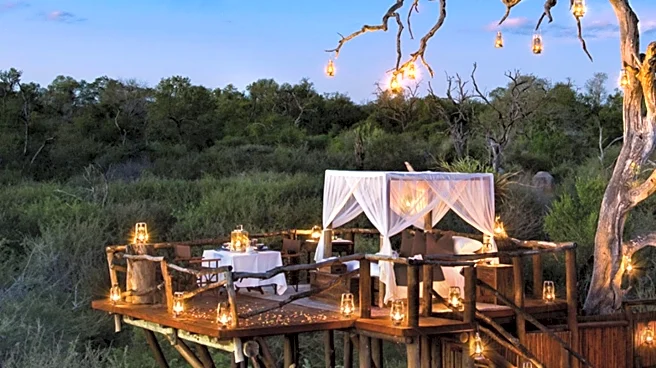What's Happening?
Luxury hotels worldwide are increasingly offering outdoor sleeping experiences as part of the growing trend of sleep tourism. This trend is driven by the need to address widespread sleep issues, with nearly 40% of U.S. adults reporting insufficient sleep according
to the CDC. Sleeping in nature is believed to reset the circadian rhythm, which can be disrupted by artificial light exposure. Research indicates that even a weekend of sleeping outdoors can significantly adjust the body's internal clock. Hotels are responding to this demand by providing amenities such as pillow menus, nighttime meditations, and personalized AI smart beds to enhance sleep quality.
Why It's Important?
The rise of sleep tourism highlights the growing awareness of sleep health and its impact on overall well-being. Poor sleep is linked to various health issues, including heart disease and obesity, making it a significant public health concern. By promoting natural sleep environments, hotels are tapping into a lucrative market while potentially improving the health outcomes of their guests. This trend also reflects a broader shift towards wellness-focused travel, which is expected to grow significantly in the coming years. The emphasis on natural sleep solutions could lead to increased demand for eco-friendly and nature-integrated accommodations.
What's Next?
As sleep tourism continues to gain popularity, more hotels are likely to incorporate outdoor sleeping options and other innovative sleep solutions into their offerings. This could lead to a diversification of wellness travel experiences, with a focus on personalized and nature-based interventions. Additionally, the hospitality industry may see increased collaboration with sleep experts and researchers to develop evidence-based sleep programs. The trend may also influence urban planning and architecture, encouraging designs that prioritize natural light and green spaces to support healthier sleep patterns.
Beyond the Headlines
The emphasis on natural sleep environments raises ethical and environmental considerations, such as the impact of increased travel on local ecosystems and communities. Hotels must balance the demand for nature-based experiences with sustainable practices to minimize their ecological footprint. Furthermore, the trend underscores the importance of addressing artificial light pollution in urban areas, which can have broader implications for public health and environmental conservation.















